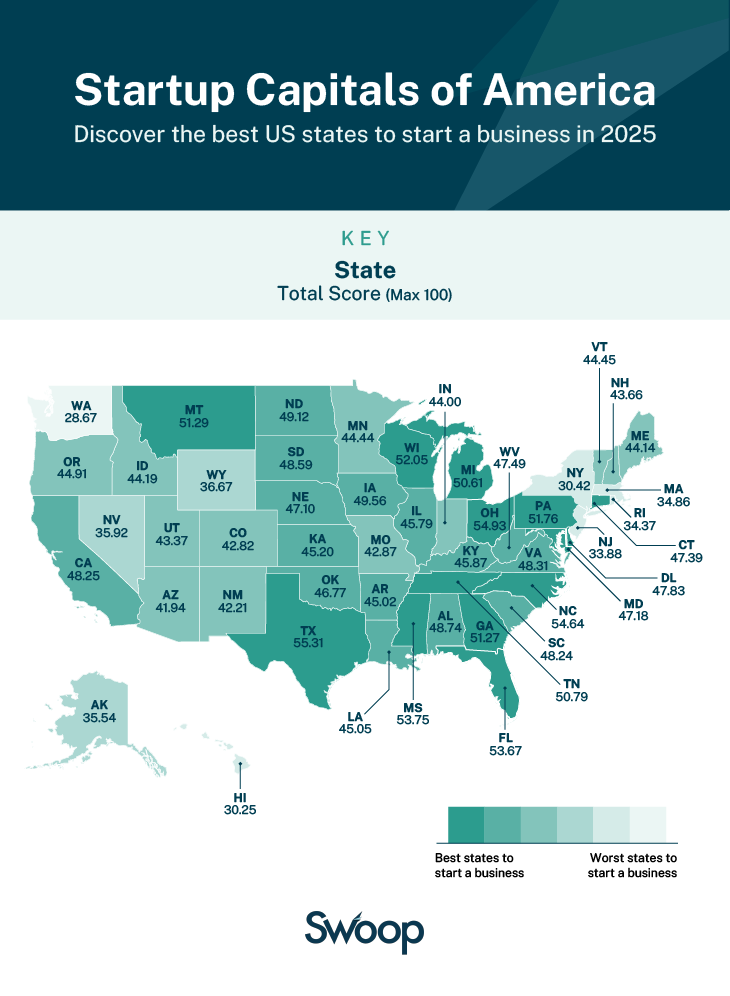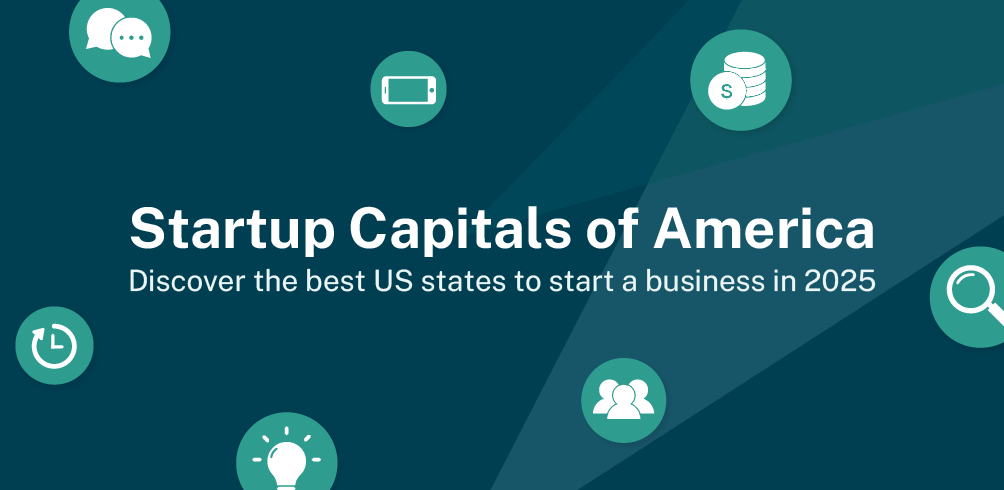Every year, almost 670,000 small businesses are launched in the USA by entrepreneurs looking to turn their passion project into a career. Sadly, running your first business can be an uphill struggle, and 21% of small businesses will fail within their first year of opening. Only a quarter of startups last beyond the 15-year mark, so long-term success can be hard to maintain.
With so many hopefuls aiming to start a new business in 2025, we’ve counted down the 10 best states in America for launching a successful startup. We analyzed factors ranging from sales tax rates to the average cost of renting office space and awarded each state a score between 0 and 100 based on their rankings. Read on to find out which states received our highest scores, making them the ideal spots to kickstart your entrepreneurial career.
1. Texas
Texas has been a hub for business activity in America for many years. Since the 1990s, Austin has been nicknamed “Silicon Hills” for its bustling tech industry, and Dallas has a strong stake in healthcare, education, and finance markets.
The state is the 4th highest in our rankings for venture capital investments, with $6.66bn being funneled in annually, and has the 3rd most entrepreneurs of any state in America at just over 40,000. This makes it the second-best state nationally for business viability, only being beaten by California.
Most impressively though, it’s the number one destination in the country for coworking spaces, with 280 available. This contributes to its status as the #1 state in America for business support quality according to our rankings.
All these, plus other high scores across the board, give Texas a total rating of 55.31 on our list. It’s a close race at the top, but it takes the lead as the best startup location in America. Plus, with 53% of its businesses surviving beyond the 5-year milestone, it beats the national average for continued success.

2. Ohio
Just behind Texas in our rankings is Ohio, which scores 54.93 on our index. Its crowning achievement is the cheapest office rent per square foot in America, at $14.82 on average. Additionally, it places in the top 10 states for coworking spaces with 197, offering plenty of options when it comes to establishing a home-base for your business.
Ohio also boasts the joint 4th highest business survival rate past 5 years in the US (55%), and with an estimated 11,950 entrepreneurs in the state already, it has a proven track record for startup success.
Major industries in the state include manufacturing and automotives, but with retail hubs such as Columbus – which has been used as a testing ground for businesses in the past – there are a number of opportunities for successful small businesses
3. North Carolina
With the 7th highest rate of business survival, and the 9th most entrepreneurs by state, North Carolina secures third place on our list of America’s startup capitals. It’s also home to 233 coworking spaces – the 5th most in the country, and more than double the national average. North Carolina’s total score is a total of 54.64, putting it less than one point behind first place with above-average totals in almost every category we monitored.
4. Mississippi
While Mississippi scored highly across multiple criteria, its main advantage is very clear. Across all 50 states, Mississippi has the cheapest operational costs on average. Not only does it have the lowest average hourly wage ($27.03), it’s also the cheapest state on our list for health insurance, with employers contributing just $5.61k per employee annually on average.
It’s also the second cheapest state on our cost-of-living index (only beaten by Oklahoma), and tied for 6th place in low unemployment rates across America (2.9%), giving it a strong workforce to find new employees from. Despite low scores in categories such as coworking spaces and venture capital investments, it earns a total score of 53.75 and claims 4th place on our list.
5. Florida
Less than 0.1 points behind Mississippi is Florida, which earns 53.67 and a top 5 finish on our rankings. It’s the state with the most entrepreneurs in the USA by our findings, with more than 50,000 across the state.
In addition to its entrepreneurial spirit, Florida has the money to back it up. With $2.69bn in venture capital investments annually, it’s the 7th most attractive state to investors in America. It also comes incredibly close to equaling Texas’ score for the most coworking spaces, being pushed into second by just one point.
Florida’s economy is the fourth largest in America by gross state product, pulling in more than $1 trillion every year as of 2024. Agriculture and tourism rank as two of its biggest industries, with Miami serving as an economic center. Its business survival rate is below average at 50.1% over 5 years, but its other high rankings make it an attractive home for new small businesses.
6. Wisconsin
Although Wisconsin doesn’t often attract huge venture capital investments or big crowds of entrepreneurs, it ranks as one of our top 10 states for its economic environment. With the joint 6th lowest rate of unemployment in the country, below average cost-of-living, the 5th lowest rate of sales tax in the United States, and roughly $13,930 in income tax free allowance, it’s a state with a strong local economy.
Additionally, Wisconsin has the second lowest rent for office space by state, with a square foot of office space setting you back just $15.19 per year on average. Finishing with a score of 52.05 on our index, it earns a place in our top 10 startup capitals in America.
7. Pennsylvania
A state with multiple major financial hub cities, Pennsylvania earns a score of 51.76 and claims seventh place in our rankings.
It’s the 5th best state in our rankings for business viability. With more than $2bn in venture capital investments per year, and the joint 3rd highest rate of business survivability across 5 years – at 56% – startups in Pennsylvania have plenty of potential for long-term success. Other strong areas include a below-average cost-of-living, 179 co-working spaces, and more than 12,000 entrepreneurs already established in the state. Its economy is the 6th largest in America by GDP, with a thriving technology industry.
8. Montana
The least populated state in our top 10, Montana takes the #8 spot with a total mark of 51.29.
With no sales tax, and $14,600 income tax free allowance, it ranks as our second best state for economic environment. Although such a sparsely populated state doesn’t bring much interest from venture capital opportunities, 53.9% of businesses are expected to last past their first 5 years. It also has the join 9th lowest unemployment rate in America, at 3.3%.
9. Georgia
With Atlanta serving as one of the South’s biggest economical hubs, Georgia manages to earn a spot in our top 10 American startup capitals. Every year, an estimated $1.6bn of venture capital is invested into its economy, and with 19,333 entrepreneurs in the state, there are plenty of startup opportunities from likeminded businesspeople.
Its other biggest advantages include health insurance costs below the national average, and 215 co-working spaces across the state. It scores a total of 51.27 in our rankings, placing it in close contention with Montana, but solidifying a top 10 position.
10. Tennessee
Rounding out the top 10 is Tennessee, which earns high marks for its low prices. Behind Mississippi, it’s the second-lowest state in America for operational costs, with office rent prices of just $16.53/sq ft per year on average.
Its other price advantages include an hourly wage of $30.07 on average (7th lowest in America), and the 6th lowest health insurance costs in the country at an average of $5,833.
Totaling 50.79 points on our overall score, it beats states like Iowa, Michigan, and North Dakota to earn its status as our final American startup capital.
While it’s true that you can start a successful business anywhere, choosing the right location can be a difficult task. Your aim should be a market with a stable economy and appropriate business support, without oversaturation from competitors. Many larger states famous for their business industries are too expensive for budding entrepreneurs to afford, so be mindful of your circumstances when planning your new startup.
Swoop Funding CEO Andrea Reynolds says “The key to a small business is to outline your goals and be prepared. Once you’ve taken your first steps towards starting your business, an effective plan for your future and the ability to adapt are the differences between a small business that lasts and one that fails shortly into its life.
A business grant can be exactly what’s needed to give your startup the platform it needs to grow. There are numerous options to choose from, so research wisely and find the loan that suits your project best.”
Links and sources:
- Population rates: https://www.citypopulation.de/
- Unemployment rates: https://www.bls.gov/web/laus/laumstrk.htm
- Cost of living index: https://www.statista.com/statistics/1240947/cost-of-living-index-usa-by-state/
- VC investment by state: https://www.statista.com/statistics/424167/venture-capital-investments-usa-by-state/
- Average health insurance contribution: https://www.kff.org/other/state-indicator/single-coverage/
- 2024 sales tax rates: https://taxfoundation.org/data/all/state/2024-sales-taxes/








 yet? Register here!
yet? Register here!